When it comes to cleaning, I don’t like to overpay for watered-down chemicals. That’s why I tend to prefer cleaning products that I can buy in as concentrated a form as possible, preferably in bulk. Often, these products are aimed squarely at professionals, who tend not to tolerate the weak stuff. So, as the “product guy” for Aftermath, I have compiled a list of hyper-niche cleaning products that, if not useful, are at least interesting.
Note: I am not a chemist, I am just a guy with a lot of hobbies who loves researching and reading forums. If you decide to buy any of these products, please follow the manufacturer’s instructions and guidelines. Aftermath does not endorse the misuse of any of these products.
Zinc Ricinoleate/DeoConcentrate/Trader Joe’s Natural Deodorant – The Odor Destroyer
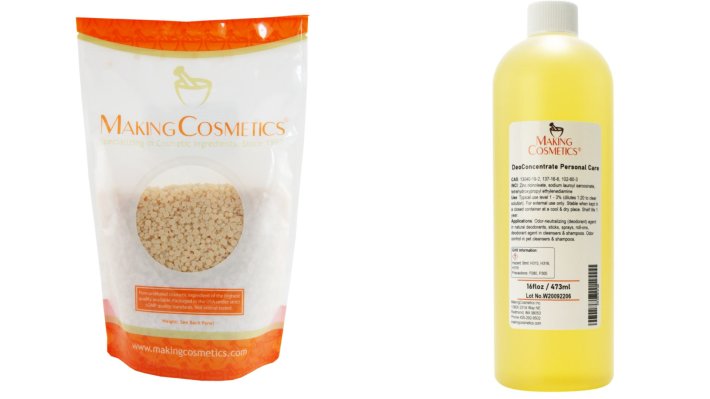
A few decades ago I started getting contact dermatitis while using deodorants and was forced into the world of “natural” alternatives. This was a mixed blessing. On the one hand, antiperspirants are awful for your clothing, oftentimes leaving horrible yellow stains and reducing the life of your garments. The flip side is that most natural deodorants at the time sucked, were wildly overpriced, and were based on baking soda.
Baking soda is not a good ingredient to use in deodorant. It can mess with the pH of your skin, cause a lot of irritation, and generally doesn’t do a great job at suppressing body odor. Eventually, many of the good natural deodorant brands moved over to using magnesium hydroxide, which is also the active ingredient of the laxative milk of magnesia. It works pretty well, doesn’t mess with your skin, and you can buy a kilo of it for about 20 bucks online if you decide to get into making DIY deodorant. Making your own deodorant is much cheaper than paying 10 dollars a stick, and you can buy empty containers in bulk online. This is what I ended up doing.
This line of research led me to one cosmetic chemistry forum and a substance called zinc ricinoleate. It’s a fatty acid that comes from castor oil and will demolish any foul odor like magic, although it isn’t as widely used in deodorant as magnesium hydroxide. Zinc ricinoleate is pretty benign according to its SDS sheet, seemingly well-tolerated and is usually sold in the form of little yellow pellets that melt together with other fats if you are making a stick deodorant. As with anything involving hygiene products, always be cautious about how your skin reacts.
MakingCosmetics also sells a liquified variant of it called DeoConcentrate that is a viscous yellow fluid. It’s concentrated and can be used as an ingredient in a DIY room spray that will exorcize any foul odor like a demon. It’s very handy if you want to make a Febreze alternative that does not smell awful (although the actual chemical in Febreze is fascinating unto itself). MakingCosmetics also has recipes for solid and roll-on deodorants as well as room sprays on their site. It should be noted that zinc ricinoleate is not a sanitizer, so I would not rely on it as a cleaner, and it should be mixed with some kind of preservative.
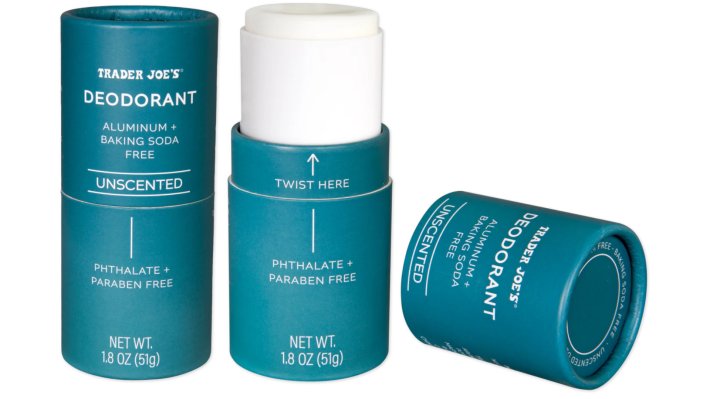
After I figured all this out I discovered that Trader Joe’s of all places sells a comparatively inexpensive, unscented magnesium hydroxide and zinc ricinoleate-based natural deodorant that kicks ass. It’s like 5 bucks and comes in a green paper tube that uses less plastic than other brands. It’s the exact thing I was looking for. My long nightmare is over, though if they ever discontinue it I am going to get so mad.
Tergazyme and other enzyme cleaners – don’t fear the zyme.
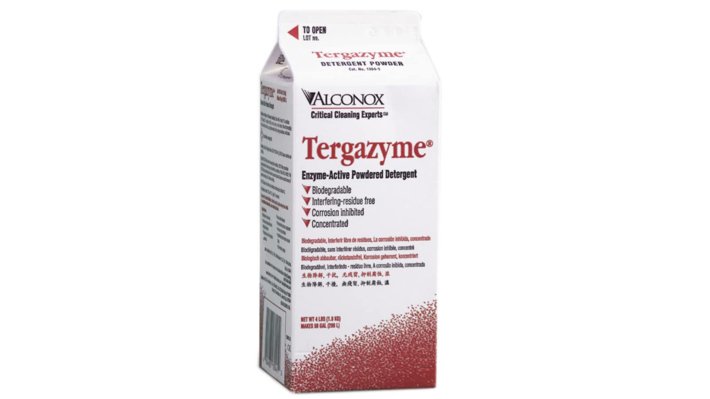
Enzyme-based cleaners are fantastic for breaking down biological material. There are a bunch available for home use – for example I’ve used Zout before for spot cleaning stains, and I hear that P&S Terminator is solid. Biokleen Bac-Out is well loved for cleaning up animal messes, as is Nature’s Miracle. Amazon sells its own band of bulk enzymatic cleaners as well.
In a professional setting, Tergazyme is a concentrated enzymatic medical detergent that is primarily used in hospitals, tattoo shops and lab settings. This stuff is the best if you need to clean soil, tissue, blood or bodily fluids from metals, plastic, ceramic, rubber, fiberglass or porcelain. You can get 1.8 kilos of it for 40 dollars. It requires 10 grams per liter of solution, which means it lasts most people a very long time. While it is technically not meant to be used on clothing, I have used it on synthetics, cleaning the surface of a pair of nylon boots to the point where they looked brand new.
I read one review that praised it for its cleaning power when removing smoke damage from a chandelier, and have seen multiple reports of it destroying cat pee. In general, I would stick to what the manufacturer Alconox recommends. It is apparently extra useful when combined with an ultrasonic cleaner. It should also be noted that Tergazyme contains phosphates, which is an ecological concern for its impact on algae blooms. If you do use it, be mindful of that. Alternatively, the manufacturer Alconox sells phosphate-free alternatives for that reason.
Star San, PBW – That stuff I used to use for homebrewing
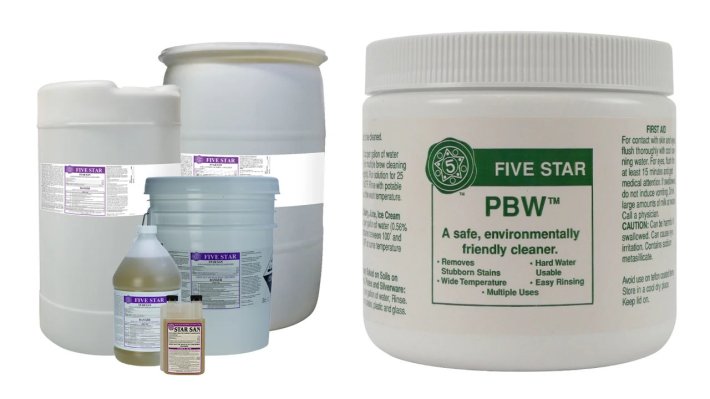
Back in the late 2000s to early 2010s I did a lot of all-.grain beer brewing, as was the style at the time. This involved a lot of work, bulky equipment and obscene amounts of cleaning. Generally speaking, brewing was not cheaper than buying beer once I factored in the crap I had to buy and store in my living space, as well as the general cost and danger of having a kegerator in the living room of an apartment I shared with two other guys. That said, brewing is one of those hobbies like growing weed where you end up learning about a lot of things tangentially related to it. This is how I learned about Star San by the company Five Star Chemicals.
Star San is an acid-based contact sanitizer used for brewing equipment. It comes in a bottle with a measuring chamber built into it. Star San is tremendously concentrated and foams a whole lot. The excessive foam serves a purpose, as it helps sanitize hard to reach places in your equipment. In a homebrewing context, it is often used to sanitize a carboy, which is a big five gallon glass jug you put your unfermented beer (also known as wort) into.
An additional quality that makes Star San a go-to for brewers is that the foam is no-rinse, meaning you can just dump your wort directly on to the foam and it’ll be fine and is in fact good for the yeast. This led to the idiom “don’t fear the foam” in homebrewing circles. For people who are paranoid about putting their meticulously crafted beer on what appears to be soap foam (these people are cowards) BTF Iodophor Is also used by breweries for similar reasons. Five Star Chemicals also makes Saniclean if you want a product with less foam for whatever reason. Both products contain phosphoric acid, which is less of an issue if you are pouring your young beer directly on to it for the yeast to eat. Five Star also makes PBW, which I remember liking, although I hear people often just use OxiClean now instead. I haven’t used Star San in over a decade and would probably not use it for anything except brewing, but I remember its sudsy, giant foam bubbles fondly, as it always radically simplified homebrewing.
Atsko Sports Wash – Detergent from a hunting company
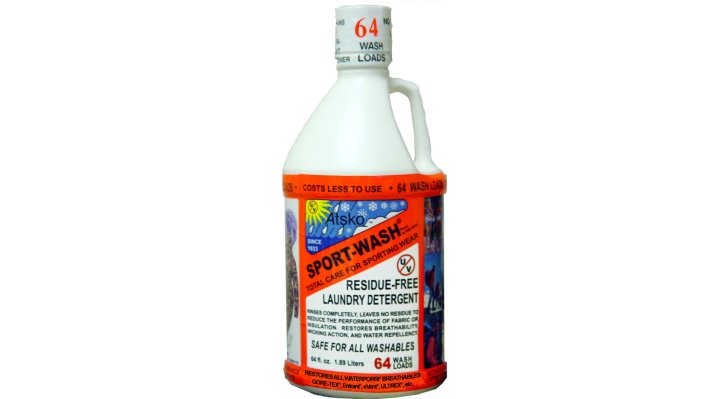
I have an unconditional love of any product that looks like it was designed by an eccentric uncle. Dr. Bronner’s has made an empire on its label. Odoban, the odor eliminator that they sell in gallon concentrates by the checkout at Home Depot, also specializes in hunting equipment chemicals. (That brand, Lethal Products, also has a YouTube channel which is now where they just upload hunting videos). Atsko Sports Wash is a similar product from a similar company. It is a scentless detergent without optical brighteners or fragrances that is concentrated and less expensive than similar technical washes. Its lack of brighteners and scents is because Atsko makes a lot of hunting-related gear, and so additives are a going concern (they have a section of their website dedicated to deer seeing UV). I don’t hunt but the actual wash itself is so good I have switched over to it entirely for cleaning synthetics and performance fabrics, which I have a whole lot of. Atsko sells a silicone based waterproofer that I have not tried yet but which seems very well-liked.
Thymol and Decon 30 – That time I became mentally unwell because of mold in my house
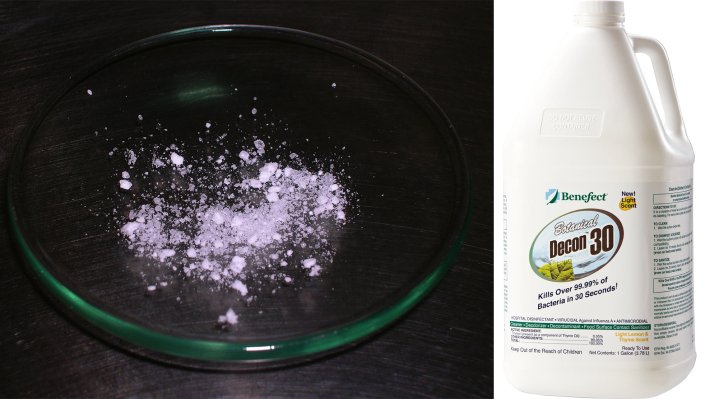
Earlier this year a pipe burst upstairs and mold started growing in the wall. This led to a massive dip in the quality of my air and life as I tried to get my landlord to fix it for several months. The months of mold exposure also lead to a general descent into stress-based internet research. Exposure to mold can really mess your life up for a while but worrying about mold can sometimes make matters way worse.
This is part of the reason why there are two different subreddits on the topic of mold: r/mold and r/toxicmoldexposure. The former does not allow the topic of health outcomes to be discussed there, while the latter frequently descends into paranoia like Julianne Moore in the movie Safe. If you want strangers to recommend you throw out every couch, rug and porous object you own after having mold, go here. While my mold issue is now mostly fixed, I did end up doing extensive research into what mold remediation companies use in cleanup. A lot of them are nasty chemicals like Peroxyacetic Acid. Do not use this chemical. It works like hydrogen peroxide on steroids, and can be super dangerous. A guy I met who cultivated yeast strains for pharmaceutical companies told me it can destroy your sense of smell.
The most interesting one is Thymol. Thymol is a constituent of oil of thyme which is claimed to be a fungicide, pesticide and disinfectant. Unlike bleach or nasty contact cleaners, thymol-based ones claim to have a safe profile. Beekeepers use thymol as a miticide for controlling varroa mites. The most common thymol-based solution I found fungus remediators using is called Decon 30, but if you look at the ingredients you’re mainly looking at a tiny amount of thymol as the active ingredient, mainly derived from essential oils. Benefect, the company that makes it, claims it is less dangerous than vinegar. They also sell big containers of thymol crystals online, although I ultimately did not do that, I just bought thyme essential oil and added it to surface sprays. I have not done a scientific analysis of its fungicidal or virucidal properties, but I find the herbal smell delightful and that’s enough for me.
Cafiza and Dezcal– The stuff I use to clean my espresso machine
If you own an espresso machine or a Zojirushi hot water boiler, you might have spent money on a descaling solution to get all the built-up mineral deposits out of the machine. A lot of times these are overpriced. In the coffee world, Cafiza and Dezcal by the company Urnex are often the go-to for cleaning and descaling coffee equipment respectively. Cafiza is a backflush detergent and is great for getting the oil and gunk out of a portafilter. Dezcal is for descaling most commercial machines (although some home coffee makers are apparently different). People also seem to like Cafiza for cleaning wine glasses out. Make sure you rinse Cafiza out thoroughly. Most descalers are either some combination of lactic, sulfamic, or citric acid. For the purpose of defeating limescale, I have used Durgol which is also well liked. I have also seen many people argue for and against citric acid as a descaler in espresso machines with an aluminum boiler.
OxiClean, Vinegar, Citric Acid, Hydrogen Peroxide, Bar Keepers Friend, Bronner’s, Degreaser – The Basics
There are just some substances that cost next to nothing and are recommended forever for a reason. Having a bunch of OxiClean (generic or not), vinegar, hydrogen peroxide, and citric acid in your house for cleaning is handy. All of these are so tremendously cheap and obvious that they don’t break the bank. Isopropyl alcohol is also handy to have around, but your mileage may vary there and I'm trying to avoid recommending readers to order flammable liquids in bulk here. Bar Keepers Friend (oxalic acid) is invaluable for cleaning metal; I have also used it to passivate stainless steel during my brewing days. In addition to this, I also keep a gallon container of Dr Bronner’s in my house and a heavy duty but fairly green cleaner/degreaser like Simple Green, although I hear Purple Power does the job too.
WHOOSH! – the glass cleaner that the Apple Store (supposedly) uses
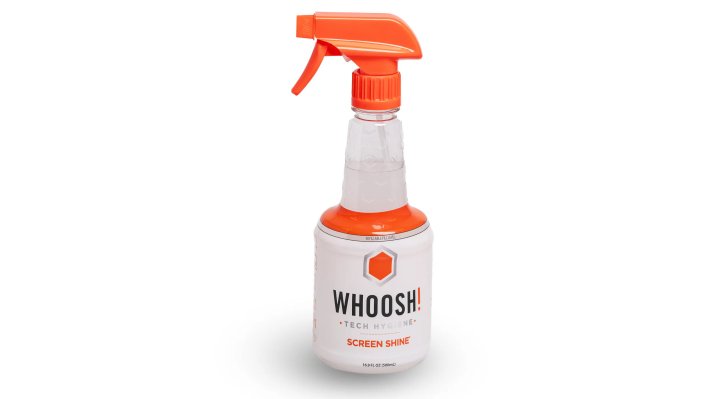
WHOOSH! is the screen cleaner that is (supposedly) the stuff that the Apple store uses to clean its devices. I have seen this repeated a lot on the internet. WHOOSH! itself has a photo that looks like blurred out Apple employees cleaning their screens with it on their website. I am not sure if Apple still uses this stuff or if they have moved on to a different product. Either way, it does a pretty solid job of cleaning screens. As with most things involving device screens, follow the instructions and never spray it directly onto your screen. I learned that the hard way with a laptop when I was in college.
Kimwipes – very delicate wipers that are used in labs
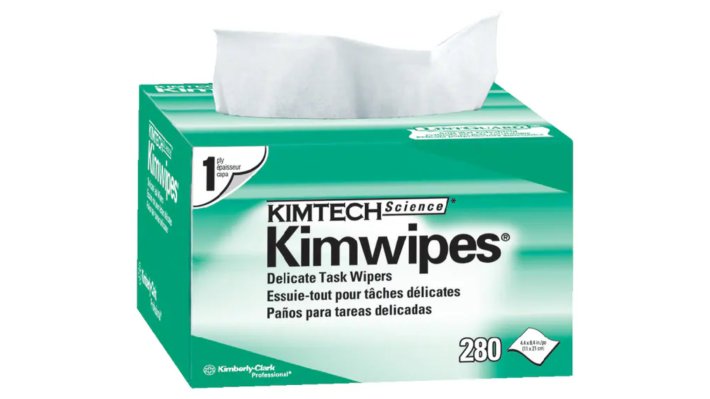
At one point in your life you may ask yourself “how do you properly clean a microscope?” If so, you might be interested in Kimwipes. Kimwipes are lint-free antistatic wipes that are as delicate as you can possibly get. This is one of those things that laboratories stock 24/7 because they are useful for cleaning a lot of delicate equipment. You order them in big kleenex-style boses. If you have electronics, microscopes or screens around, these things rock.
Related to this, Novus polishing mattes and the polishing kit are excellent if you are trying to clean and polish plastic or acrylic. This is particularly useful if you are trying to restore the sheen on a disc, like a laserdisc.
LensPens – fingerprint smudges will be gone forever
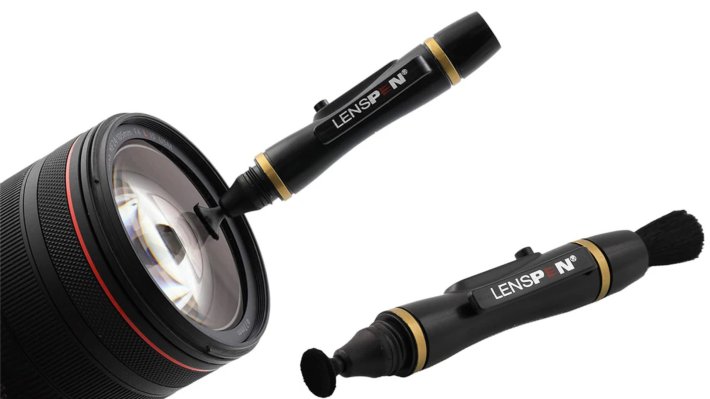
LensPens are inexpensive pen-shaped cleaning sticks that will make any lens sparkle in seconds. I have a few kicking around because I own about 30 or so vintage film cameras. If you have a big fingerprint on your lens, a lens pen will erase it in about 10 seconds without damaging the lens surface. It also comes with a tiny, soft bristle brush on the other end for brushing away dirt. Cleaning lenses sucks a whole lot, and this simplifies the entire process by a whole lot. If you do any kind of photography, lens pens are a great investment.
Fast Orange, Gojo and Lava Soap Bar – The Orange Soap
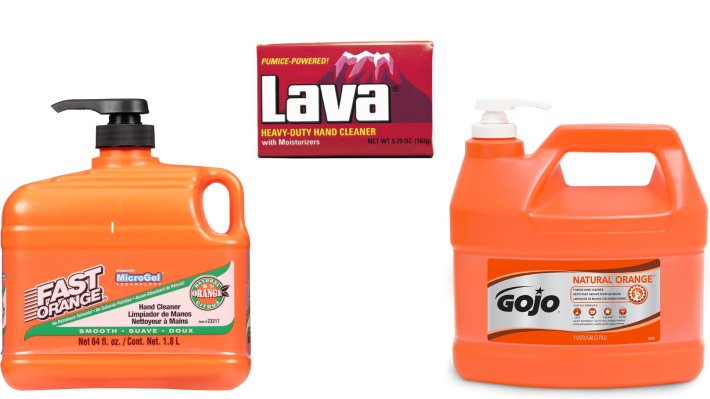
Soap is soap, and then there’s the soap you find in the garage. This is the stuff that comes in a huge pump bottle and will strip any oil off of your hand. If you have worked at a garage or a bike shop you know this stuff. These are pumice based and exfoliate the hell out of your hands. I can’t imagine they are good to use all the time, although my hands feel baby smooth after using it. If you are handling oil and need that stuff off your skin, this is the stuff to use.
CAIG DeoxIT and other contact cleaners – make your electronics work again
If you do a bunch of hacky stuff with electronics or old computers, conductive surfaces like connectors and potentiometers will often get nasty and oxidized, lowering their efficacy. Contact Cleaner is what you need to fix this. For most people, DeoxIT by CAIG Laboratories is the go-to, although it does have its detractors. They have a huge line of products specifically for this purpose, and DeoxIT will not only clean your old electronics but protect those surfaces from further oxidation. For most normal people who aren’t dicking around with electronics, they have one specifically aimed at fixing the port on your phone that I have personally used. A little goes a long way, so anything you get will last you a long time. CAIG isn’t the only game in town though, and there are several companies that make great contact cleaner. CRC Q5 has its fans and MG Chemicals, who I trust with many of my soldering needs, has a line that people seem to love as well.
Weird Cleaning Products That Other People Mentioned
In addition to things I’ve used personally, I put out the call for cleaning products people have used or are obsessed with. Here are some of the responses I liked the most. I have not personally tried out any of these products, I just think they are novel or interesting.
Ship Shape - This is the stuff that barbers use to clean hair out of stuff. It’s produced by Barbicide, the quat-based blue liquid you see barbers put their combs in. It has a cakey yellow powder. Looks like it’s fantastic at melting hair. H/T: My barber.
First Contact - a fascinating and bizarre niche polymer-based optical cleaner for instruments. It fits the shape of whatever lens you have and then can be peeled away. Watch the video, it’s bizarrely satisfying. H/T: ndr3w
Dymon Problem Solver - a jellied baseboard cleaner meant for removing wax and soil buildup on floors. The reader suggesting it claims that it is useful for more than baseboards. H/T: cephascornelis.
Weiman Stainless Steel Polish – I’ve used Weiman in the past for cleaning granite and stone, but their steel polish gets a ton of use in restaurant settings. My friend John reminded me about how good their stuff is.
Heat’n Kleen - Meant for cleaning the insides of popcorn machines and kettles. You put it in your kettle, heat it up, then dump it out. If you have become a Flavocol head, this is probably up your alley. The manufacturer touts that it is very safe but I have never used it and cannot attest to its efficacy. Credit to Ninaolive.
Carbon Off - This stuff is made by a company called Val-U-Chem and will strip baked-on carbon off of metal. Really nasty stuff. It apparently smells wretched. I would like to stress that I have not used this stuff and cannot recommend it, but I like that they also sell it in a big metal canister like it’s bulk olive oil. I went down the rabbit hole of refinishing carbon steel pans earlier this year, and the chemicals you need to do that effectively (not counting white vinegar) tend to be unpleasant and very noxious. Credit: punishedcornpop
The same user mentioned Block Whitener – a super concentrated jellied bleach product restaurants use for making their cutting blocks super white. It seems super nasty and dangerous but fascinating. “The gel consistency also makes it stick very well to skin, making it perfect for chemical burns. Kind of a cold napalm.” I do not recommend anybody buy this product, it seems really dangerous. Credit: punishedcornpop
Royal Magic Gel - This is the stuff you put on the ground to clean up barf, blood, or pee off the floor. I am not spilling those things on the floor of my apartment enough to require it, but if that ever changes I will consider it. Credit to Ziggystarfish.
VWR® SoftGUARD® Extra-Strength Barrier Hand Cream - "Your oddly specific cleaning products article reminded me of my absolute favorite hand cream when I worked in my lab." Quickly checking the SDS I can see this stuff has Zinc Oxide in it which is used in baby rash creams and is fantastic for dry skin. Credit: Matt Munley via in the Highlight Reel Discord
Cole-Parmer Micro-90 Cleaning Solution - "For industrial glass cleaning there's stuff I’ve found repackaged by different companies. One of which sells it by the mL for $50. And tells you to dilute 1000x! Another diluted it ten times, and still sold it as 10x concentrated for $50 / L, 20 years ago." I would note the SDS on this states that it is not for home use. Credit: davidralin on Blue Sky
Full Bore Extreme Green - "Worked at an oil refinery and this is the shit the operators put in the bathroom and will get the nastiest gunk off your skin and leave it baby soft. Also followed by Working Hands cream, my skin was never more moisturized even living in the arid desert of NM." Credit: lanini on Blue Sky.
Those are the freakish cleaning products I have used at one time or another. I hope in this list you find something that finally fixes a hyper-specific problem that has been plaguing you for years.


